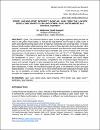Chapter 12: Sports migration to Gulf Cooperation Council states: the intersection of economic growth and sport development; In Handbook on Sport and Migration Edited by Joseph Maguire, Katie Liston, and Mark Falcous
| Author | Amara, Mahfoud |
| Author | Akindes, Gerard |
| Available date | 2025-05-21T10:12:49Z |
| Publication Date | 2024-09-19 |
| Publication Name | Handbook on Sport and Migration |
| Identifier | http://dx.doi.org/10.4337/9781789909418.00020 |
| Citation | Amara, M., & Akindes, G. (2024). "Chapter 12: Sports migration to Gulf Cooperation Council states: the intersection of economic growth and sport development". In Handbook on Sport and Migration. Cheltenham, UK: Edward Elgar Publishing. Retrieved May 21, 2025, from https://doi.org/10.4337/9781789909418.00020 |
| ISBN | 9781789909401 |
| Abstract | For the past 20 years or so, a significant influx of professional athletes, sports practitioners, coaches, sport scientists, physical education (PE) teachers, and sports journalists, to name but a few, have arrived in states of the Gulf Cooperation Council (GCC). This pattern is likely to continue as Qatar, the UAE, Bahrain, and more recently Saudi Arabia continue to grow as new global hubs for the sport industry, particularly in the areas of sport events, sport tourism, and sports hospitality, as well as elite and community sport development (Amara and Theodoraki, 2010; Amara, 2012; Campbell, 2010). Sport is also employed in the branding and image-making of cities in the region. These cities are increasingly associated with sport entertainment and are promoted as must-see destinations for sport tourists and fans of motor racing, golf, boxing and other extreme sports. The example of the mega NEOM project in Saudi Arabia, which is being built around these themes, is particularly noteworthy. Sports play a central role in the neoliberal urbanisation strategies of the Gulf region’s coastal cities. These strategies are a blend of consumerism, entertainment, and global tourism initiatives (Scharfenort, 2012). It could be suggested that the GCC region exemplifies the ‘glocalisation’ trend, providing its inhabitants (both citizens and expatriates) with the opportunity to be at the heart of global consumption and contemporary Arab-Islamic culture. It fulfils the benefits of residing and working in wealthier, economically developed countries that offer the additional advantage of providing a safe and family-friendly environment |
| Language | en |
| Publisher | Edward Elgar Publishing |
| Subject | Sports labour migration Gulf Cooperation Council (GCC) Global sports industry Commercialisation of sport Professional athletes Elite sport development Sport broadcasting |
| Type | Book chapter |
| Pagination | 140-149 |
| EISBN | 9781789909418 |
Files in this item
| Files | Size | Format | View |
|---|---|---|---|
|
There are no files associated with this item. |
|||
This item appears in the following Collection(s)
-
Sport Management [4 items ]



